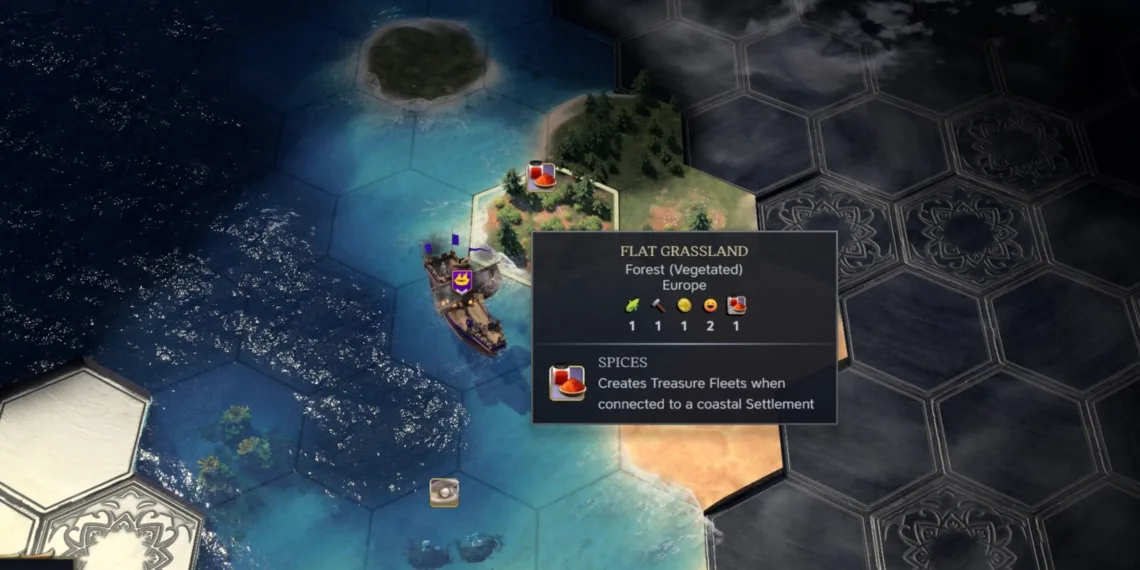Select Language:
Although treasure fleets and treasure resources are fundamental components of the Exploration Age in Civilization 7, they aren’t clearly defined in the game. To fully realize this age’s economic legacy, players must gather 30 treasure fleet points, which becomes significantly easier once the mechanics are understood.
If you’re aiming for an economic victory using leaders like Pachuti, treasure fleets are not only crucial for the legacy path but also a vital income source during the Exploration Age. The intricacies of managing treasure fleets primarily revolve around strategic positioning and settlement, while the actual process of managing them tends to be quite streamlined after you meet the necessary requirements. This mechanic can be leveraged by anyone exploring the expansive world of Civ 7.
How to Acquire Treasure Resources
Exclusive Resources Found Only in Distant Lands
In light of the numerous negative reviews concerning Civ 7‘s user interface, it’s worth noting that treasure resources, while simple in concept, are poorly explained. Unlike other resources in the game, treasure resources serve a unique purpose. They are not transferable to different settlements but are exclusively used to create treasure fleets.
Currently, there are four types of treasure resources: cocoa, spices, tea, and sugar. These resources are found exclusively in remote territories, clearly marked by their separation from your original continent by a substantial ocean barrier. While their acquisition differs from conventional resources, they follow the same general process. Once a town is established close to a resource, you can expand that town onto the hex to claim it.
All cities have a maximum expansion range of three hexes from their starting position. You can measure this distance from your palace to determine if a resource is accessible.
While gathering treasure resources is crucial for progressing along the economic legacy path, it’s essential to realize that treasure fleets can generate substantial revenue. Each fleet you establish will yield 50 gold for every resource. With a well-planned strategy, you might accumulate hundreds of gold in just a few turns. Along with other useful strategies for the Exploration Age, treasure fleets are a vital resource for generating income when settling distant lands, thereby supporting both economic and military legacy paths.
Generating Treasure Fleets
Shipbuilding, Treasure, and Fishing Quays
Before you can start generating treasure fleets, there are some prerequisites. First, it’s necessary to have treasure resources in your settlement’s borders and to have researched Shipbuilding, a technology that’s found midway through the Exploration Age tech tree. Additionally, any city that holds treasure resources must possess a fishing quay. These cities don’t need to be along the coast, as long as there’s a valid hex available for the fishing quay, where treasure fleets will be generated, assuming the Shipbuilding tech has been unlocked and treasure resources are secured.

Related
Civ 7: All Pantheons In The Antiquity Age
Explore the various pantheon beliefs available in Civilization VII’s Antiquity Age, the beginning of the reformed religious system.
Once these requirements are in place, any city with the necessary resources and a fishing quay will begin to automatically produce treasure fleets. This spawning process will take a few turns. To gather their gold and advance in the economic legacy path, you must return and activate the fleets within city borders on your original continent.
As noted earlier, each treasure resource associated with the city generating a treasure fleet is worth 50 gold and contributes one treasure fleet point. For instance, if a town has access to three resources, each treasure fleet would bring back 150 gold and three treasure fleet points. You can monitor the exact timing of fleet production via the resources screen on the right side of the settlement’s panel. Remember, this mechanic is exclusive to the Exploration Age in Civilization VII, and it will be replaced as soon as you enter the Modern Age.






